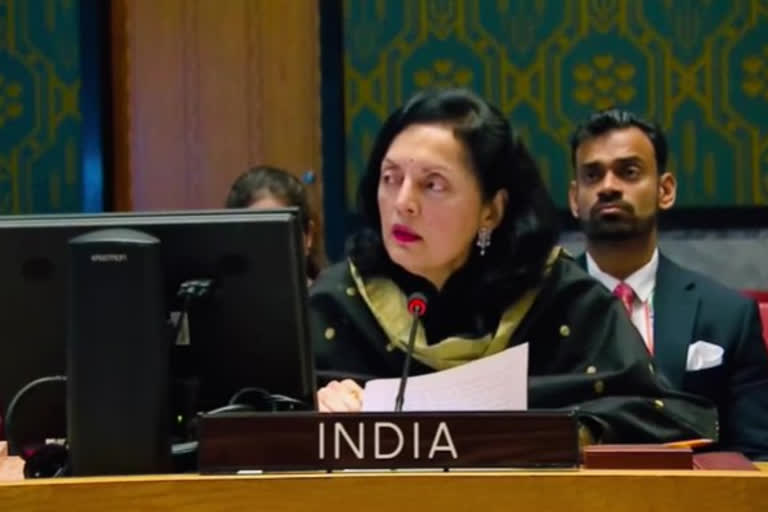United Nations: During its two-year tenure as elected member of the Security Council, India made every effort to bridge different voices within the UN body and the country will bring the "same spirit" as it presides over the Council in December, India's envoy here Ambassador Ruchira Kamboj said on Thursday. India on Thursday assumed the monthly rotating Presidency of the Security Council, the second time after August 2021 that India is presiding over the Council during its two-year tenure as elected UNSC member. India's 2021-2022 term on the Council ends on December 31, with Kamboj, India's first woman Permanent Representative to the United Nations in New York sitting in the President's seat at the powerful horseshoe table for the month.
"Over the last two years of our membership of the Council, I can say with confidence that we have been shouldering responsibilities well, and making every effort to bridge the different voices within the Council so as to ensure that the Council itself speaks in one voice as far as possible on a variety of issues. We will bring the same spirit to our December presidency," Kamboj said during a press conference as she briefed reporters in the UN Headquarters on India's Presidency and the monthly programme of work.
On December 14 and 15, External Affairs Minister S Jaishankar will preside over signature events in the Council on building a new orientation towards reformed multilateralism and the global counterterrorism approach and the way forward. On reformed multilateralism, Kamboj said "it is very clear that the UN of today is far from reflective of the true diversity" of the UN's wider membership. She said that 22 years after world leaders called for comprehensive UN Security Council reform, " we have not moved an inch and there is even lack of a negotiating text."
She added that the global development architecture outside the United Nations is "equally distorted" and would require intense efforts to enhance the coherence and consistency of the international monetary, financial and trading systems. "There is a ray of hope, if I may put it that way," Kamboj said as she pointed out that during the high-level 77th session of the General Assembly, 76 countries favoured UNSC reforms and 73 spoke for UN reforms.
"This is not a serendipitous coincidence but a reflection of the thinking of the wider membership. Clearly the multi-dimensional crises facing the world today demand a representative, multilateral architecture that is reflective of contemporary global realities and is well equipped to meet emerging challenges. The UN must be fit for purpose," she said. Against this background, Jaishankar will chair an open debate of the Security Council on December 14 which "we hope will encourage Member States to exchange ideas on key issues, specifically how to inject new life into multilateralism in order to ensure that the tools we have today are adequate to address the challenges of the future, as well what should be the key elements of this new orientation for a reformed multilateral system. No doubt food for thought for all UN watchers," Kamboj said.
On December 15, Jaishankar will chair a briefing of the Security Council on a global counterterrorism approach, specifically an exchange of views on the principles and the way forward. "The threat of terrorism is grave and universal, and it is also transnational in nature. You will also agree with me that there has been a resurgence of terrorism in recent times," Kamboj said adding that there is also an increased risk of terrorists exploiting the proliferation of digitalization, new and emerging modes of communication and financing technologies.
"The existing and emerging threats call for a renewed collective approach to terrorism," Kamboj said, adding that the high-level briefing of the Security Council will provide an opportunity for the Council to take stock and build on the recent deliberations of the special meeting of the UN Counter-Terrorism Committee held in New Delhi and Mumbai in October under the chairmanship of India. The UNSC meeting would also aim to arrive at a way forward for the global community's collective fight against terrorists, she said.
Referring to the CTC meeting held in India in late October, Kamboj said this was the first time that the CTC met outside New York in seven years, and also the very first time that the Security Council Counter-Terrorism Committee met in India. At the conclusion of the meeting, a "pioneer" Delhi Declaration was adopted that "manifested the resolve of the Council to deal with the new and emerging threats in a comprehensive manner through a set of recommendations for Member States in the short term and the development of a normative framework in the form of guiding principles in the longer term."
Kamboj said that presence of victims from the 26/11 Mumbai terror attacks bought a "poignant touch" to the events "symbolizing the reposing of faith by the victims in the international community and a reflection that the Council, as a custodian of world peace and security, does pay attention to the pain of victims and would work collectively to ensure that not only would the victims get justice, but also that the world becomes a better place to exist by getting rid of the scourge of terrorism. (PTI)



